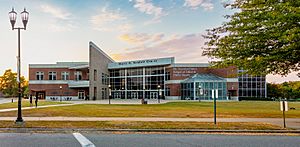Joycelyn Elders facts for kids
Quick facts for kids
Joycelyn Elders
|
|
|---|---|

Official portrait of Elders
|
|
| 15th Surgeon General of the United States | |
| In office September 8, 1993 – December 31, 1994 |
|
| President | Bill Clinton |
| Preceded by | Robert A. Whitney (acting) |
| Succeeded by | Audrey F. Manley (acting) |
| Personal details | |
| Born |
Minnie Lee Jones
August 13, 1933 Schaal, Arkansas, U.S. |
| Political party | Democratic |
| Education | Philander Smith College (BS) University of Arkansas for Medical Sciences (MD, MS) |
| Military service | |
| Allegiance | |
| Branch/service | |
| Years of service | Army: 1953–1956 USPHS: 1993–1994 |
| Rank | Vice Admiral |
Minnie Joycelyn Elders (born Minnie Lee Jones on August 13, 1933) is an American doctor specializing in children's health, known as a pediatrician. She is also a public health administrator. From 1993 to 1994, she served as the Surgeon General of the United States.
As a vice admiral in the Public Health Service, she made history. She was the second woman, the second person of color, and the first African American to become Surgeon General.
Dr. Elders is known for speaking openly about health topics. Her views on certain subjects were considered controversial at the time. This led to her resigning from her position in December 1994. Today, she is a professor emerita of pediatrics at the University of Arkansas for Medical Sciences.
Contents
Early Life and Education
Elders was born Minnie Lee Jones in Schaal, Arkansas. Her family were sharecroppers, which meant they farmed land owned by someone else. She was the oldest of eight children and was the valedictorian (top student) of her high school class.
In college, she changed her name to Minnie Joycelyn Lee. In 1952, she earned a Bachelor of Science degree in Biology from Philander Smith College in Little Rock, Arkansas.
After college, she worked as a nurse's aide at a hospital for veterans. In 1953, she joined the United States Army and was trained as a physical therapist. After three years in the Army, she attended the University of Arkansas Medical School. She earned her medical degree in 1960. She later completed her training in pediatrics and earned a Master of Science degree in Biochemistry in 1967.
Career in Arkansas
In 1987, then-governor Bill Clinton appointed Elders as the Director of the Arkansas Department of Health. She was the first African-American woman in the state to hold this job.
During her time as director, she achieved many important goals. She worked to improve health education in schools. She also helped increase early childhood health screenings and raised the immunization rate for two-year-olds. Dr. Elders expanded access to important health services, such as breast cancer screenings and care for the elderly. In 1992, she was elected President of the Association of State and Territorial Health Officers.
U.S. Surgeon General
In January 1993, President Bill Clinton appointed Dr. Elders to be the United States Surgeon General. This made her the nation's top doctor. She was the first African American and the second woman to hold the position.
As Surgeon General, she was known for being a strong voice for public health. She often spoke about difficult topics because she wanted to improve the health of all Americans. She supported the Clinton health care plan and was not officially confirmed for the job until September 7, 1993.
Speaking Out on Health Issues
Dr. Elders was an endocrinologist, a doctor who studies hormones. She was very concerned about the health of young people. She believed that education was the best way to help them make safe and healthy choices.
She also spoke about her experiences with racism. She believed that some people opposed her because she was a Black woman. She once said, "I am who I am because I'm a black woman." She used her position to speak up for communities that were often overlooked.
Resignation
Some of Dr. Elders' comments on health education caused a lot of debate. The White House felt that her views were too different from the President's. In December 1994, President Clinton asked her to resign from her position.
Life After Government

After leaving her post as Surgeon General, Dr. Elders returned to the University of Arkansas for Medical Sciences. She continued her work as a professor of pediatrics and is now a professor emerita.
She often gives lectures and speaks about important health topics, especially those affecting young people. She has appeared on television to discuss her opinions on health education.
In 2015, her former college, Philander Smith College, established the Dr. Joycelyn Elders School of Allied and Public Health in her honor. In 2016, she was inducted into the Arkansas Women's Hall of Fame.
Dr. Elders published a book about her life in 1997. She has received many awards for her work, including a Candace Award from the National Coalition of 100 Black Women in 1991.
See also
 In Spanish: Joycelyn Elders para niños
In Spanish: Joycelyn Elders para niños
- ...: A (Self) Love Story, a documentary that includes an interview with Elders
 | Laphonza Butler |
 | Daisy Bates |
 | Elizabeth Piper Ensley |

